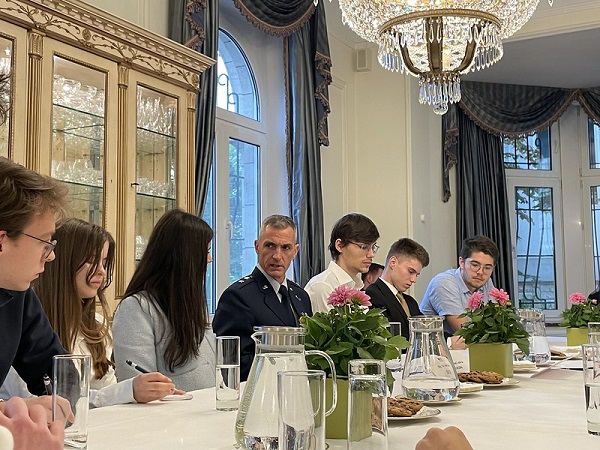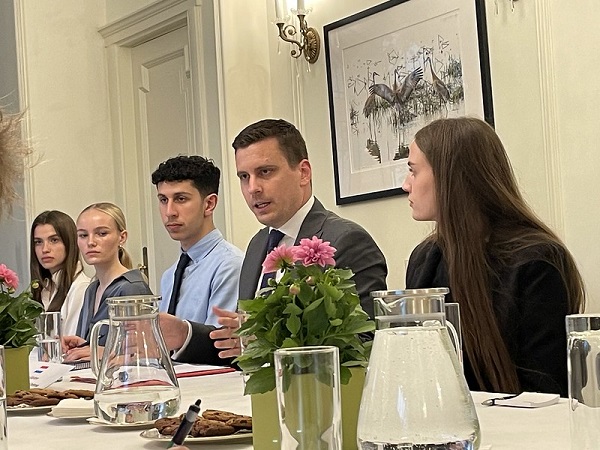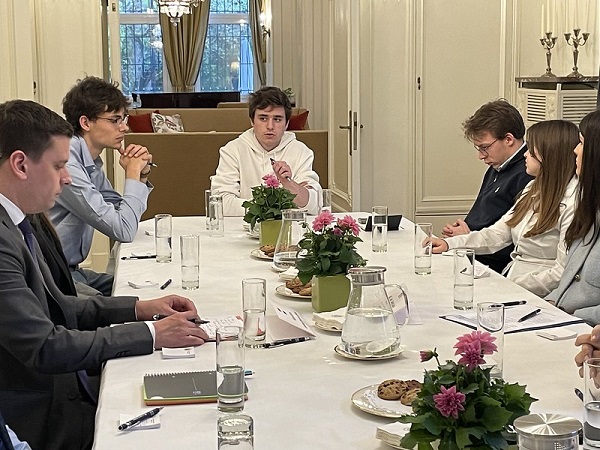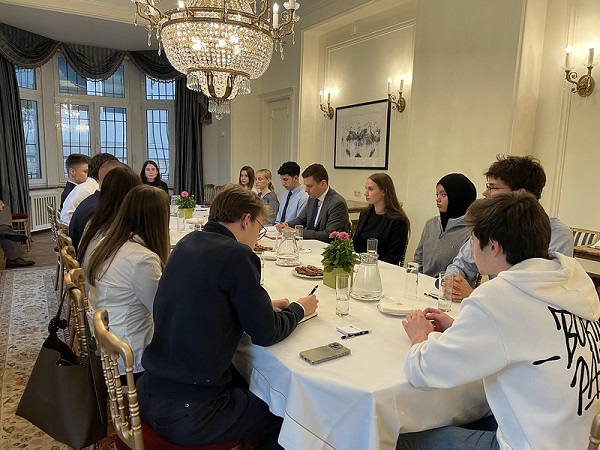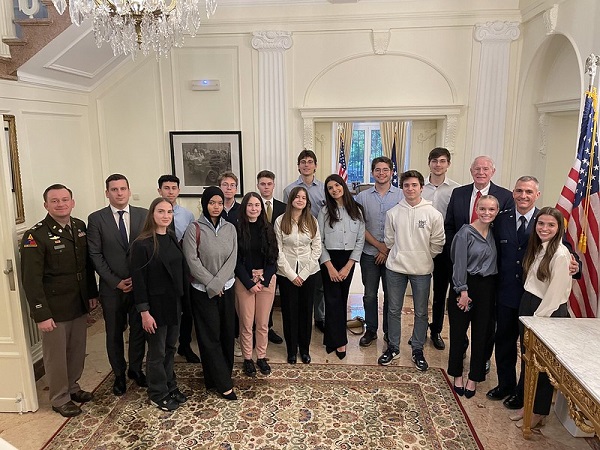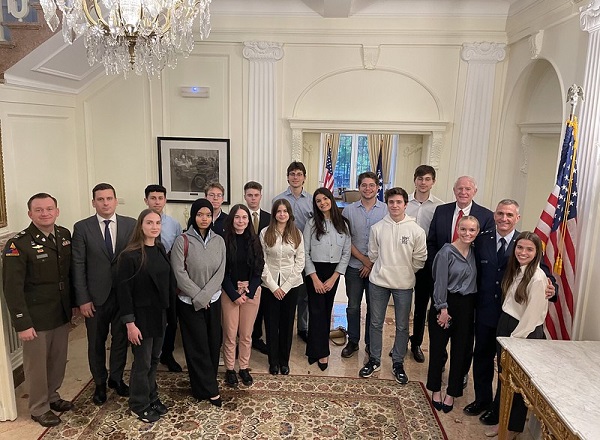 Luxembourg youth parliament members pictured with Ambassador Tom Barrett, Maj. Gen. Daniel Lasica and his two daughters, Deputy Defence Director Nicolas Gierten and moderator Jazmin Campbell (Chronicle.lu);
Credit: US Embassy Luxembourg
Luxembourg youth parliament members pictured with Ambassador Tom Barrett, Maj. Gen. Daniel Lasica and his two daughters, Deputy Defence Director Nicolas Gierten and moderator Jazmin Campbell (Chronicle.lu);
Credit: US Embassy Luxembourg
On Thursday 2 May 2024, the US Embassy in Luxembourg held a roundtable offering members of the Luxembourg youth parliament (Jugendparlament) an opportunity to share their vision for the future of NATO.
The event, moderated by Jazmin Campbell of Chronicle.lu, brought together eleven youth parliament members, as well as visiting Major General Daniel Lasica, Director of Plans, Policy, Strategy and Capabilities from the Headquarters of the United States European Command (USEUCOM, Stuttgart), and Nicolas Gierten, Deputy Director at Luxembourg’s Directorate of Defence.
The goal of this timely event, held ahead of the NATO Youth Summit (13 May) and Washington NATO Summit (9-11 July), was to provide the future leaders of Luxembourg with an opportunity to share their vision for NATO’s future and their recommendations for collective security and defence cooperation.
The roundtable kicked off on Thursday afternoon with an introduction by the moderator, followed by the opening remarks of Maj. Gen. Daniel Lasica and Deputy Director Nicolas Gierten. Addressing the youth parliament members, Maj. Gen. Lasica said: “As future leaders we want you to embrace your curiosity […] and maintain your drive to affect positive change, and to think about security in a broad perspective”. He spoke about the current complex security environment, noting that “what happens today will shape the challenges and opportunities” of tomorrow. He commended the “willingness and desire” of the young people present to prepare themselves for such challenges. Commenting on the 75th anniversary of NATO, Maj. Gen. Lasica stressed the “instrumental” role played by the Alliance in “deterring conflict and defending peace” over the years. He described Luxembourg-US relations as “a great example of bilateral security cooperation at work in the past few years”, particularly in terms of space capabilities, and emphasised that NATO memers are “stronger together”.
Deputy Director Nicolas Gierten spoke about the importance of NATO for Luxembourg as well as the importance of solidarity. Having “long profited” from the security provided by both NATO and the US over the years, Luxembourg is committed to giving back, not just taking: “Solidarity is a two-way street”. He noted that the Grand Duchy has doubled its defence budget since 2014 and is committed to increasing this again in the “next few years”. In addition, Luxembourg troops are currently deployed in NATO missions in countries such as Romania and Lithuania. Deputy Director Gierten, like Maj. Gen. Lasica before him, emphasised that it was more effective to work together, for example Luxembourg is currently creating a binational battalion with Belgium.
The moderated discussion focused on the key challenges facing NATO and its priorities, burden sharing and defence cooperation, also touching on topics ranging from the implications of climate change and the role of new technologies to cyberdefence and the fight against mis- and disinformation.
Among the key challenges, youth parliament members highlighted the threat to the east (Russian aggression), how NATO can remain cohesive in its foreign policy, how the Alliance can face climate change and its impact on security (among many other areas of our lives), and how NATO can defend itself and its member countries from increasingly frequent cyberattacks. Commenting, Maj. Gen. Lasica recalled that it was important to continue looking at the concept of security “through a very wide lens” (not only from a military perspective). It was a metter of finding the problem, identifying solutions and working together to solve the problem. Both Maj. Gen. Lasica and Deputy Director Gierten agreed on the importance of the climate discussion as well as addressing cyberattacks. Mr Gierten reiterated the value (and efficiency) of working together: “Do it well, do it once”, rather than 32 times.
On the subject of burden sharing, namely defence spending, and the fact that Luxembourg often spends the least compared to the size of its economy, participants mentioned the balance between defence spending and welfare spending, as well as the fact that there are many different arms systems in Europe and perhaps different approaches to government debt. There was a lively discussion on the need to increase defence spending and for Europe to better prepare itself for the eventuality of war. Participants debated the difference between being prepared and actually wanting to go to war. Deputy Director Gierten noted that Luxembourg has acknowledged that it “has to and will do better” in terms of defence spending. Regarding different arms systems, he noted that it was difficult to streamline this within organisations such as NATO and the EU, and countries are specialising in certain areas (as one participant suggested) but it was important to not leave oneself vulnerable.
Maj. Gen. Lasica stressed the importance of starting with the “first principles first”, noting that NATO is a defensive alliance centred around collective defence. He emphasised that the cost of deterrance is less than the cost of war - an idea shared by Deputy Director Gierten. Maj. Gen. Lasica also confirmed that the US sees its present and future linked with Europe (its values and interests); as such, it is important to look at how the two can continue to cooperate together in future. Deputy Director Gierten added that Europe and Luxembourg specifically must in turn show the US that it is willing to “take up the burden” (e.g. in terms of defence spending - which is cheaper than the cost of war).
In his closing remarks, Maj. Gen. Lasica advised the youth parliament members to “always continue to find ways to challenge your thinking” and to “relentlessly find your purpose and fulfil it every single day”.
The US Ambassador to Luxembourg, Tom Barrett, thanked everyone involved in this event. He emphasised the importance of listening to young people and what is important to them. He also noted that what we are now witnessing in Europe (Russian aggression) is something many of us thought (or hoped) we would not see in our lifetime. As such, it was important, not least for young people, to also step back now and then and consider what is going on in the world.

